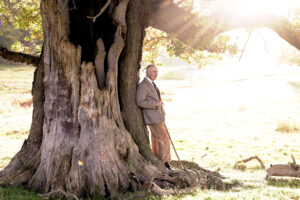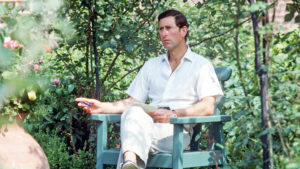As the rain lashed Parliament Square this week, and Rishi Sunak’s bizarre police bicycle escort shouted its way through Whitehall, the capital resembled a drizzly, gothic Burning Man festival. Crowds of Extinction Rebellion protestors stood huddled from the weather in their lurid purples and oranges, like penitent cultists in a late Roman city. Gone were the strange processions of accusing scarlet priestesses that marked their early protests: they had retreated to their aesthetic safe space of a crusty Student Union bar sometime in the early Nineties, a distant fug of snakebite, rollies and road bypass protests that is presumably their foundation-myth, the lost Arcadia of the eco-protest world. And between these two worlds, sliding through the crowds in his chauffeured car, inscrutable behind polished glass, sat the living bridge between these two Englands: the King.
It still feels strange to say the King, impossible to utter it without savouring the phrase as if in quotation marks: no other British title quite embodies the same tension between the lost magic of the realm and the banalities of modern public life. Replacing the careworn grandmother embodying the post-war diminution of the British state, our new king, part Athonite mystic, part pampered dandy, remains a mystery.
Just like the juxtaposition of Extinction Rebellion’s pagan eco-mysticism with the box-ticking, bell-ringing passive-aggressiveness of Sunak’s cycle cavalry, the King represents two divergent paths for Britain’s future. To supporters like myself, inclined to hail him — partly seriously and partly ironically — as a post-liberal figurehead, a champion of small family farms and a lost way of life, the King may still signal a renaissance of sorts. To his detractors, he represents all that is wrong with the 21st-century establishment. Some view him as the herald of top-down bureaucratic eco-austerity for the masses while the elites preserve their wealth and contentment; others see his recent capitulation to the race grifters and betrayal of a loyal family servant as evidence of all that is most destabilising and harmful about modern British life. There are two kings within Charles waiting to be crowned, just as there are two rival Britains struggling to be born.
The Queen’s funeral, with its sombre pomp and reassertion of the power and majesty of the state, could be interpreted as a rejection of modern Britain as much as the great festive events of her later life proclaimed a celebration of who we are now. What rich stores of symbolic meaning, then, await us at the coronation?
The sheer strangeness of this event, its apartness from modern Britain, is the essence of its meaning. When our king is anointed as God’s chosen in the great stone sepulchre of the British people, we will witness something strange and literally magical. So divorced from modernity as to be almost incomprehensible, we will witness, like puzzled anthropologists, the ancient rituals of our own lost British tribe. The choice of music, of court dress and of religious benedictions that will attend this descendant of both Vlad Dracul and Mohammed, in this most Catholic ceremony of a Protestant country, are rich fodder for grandstanding and debate. All politics, all power, is at heart symbolic, resting on ancient foundations like a modern church on ancient monoliths: only once or twice in our lifetimes will the state draw back its robes and reveal her hidden mysteries to us.
How is Charles to rule and bring this strange duality, the ancient and the modern, into public life? For decades, he was mocked as an eccentric, a weirdo who talked to his plants and praised the rustic hardships of traditional peasant life from within his palace walls. This urge to call him weird as an insult, springs from the same source as the eye-rolling ironic epithet “normal country” levelled at Britain. Instead, it is a compliment. Britain is not a normal country, whatever that would be, and thank God.
From the beginning of recorded history, Britain has always been viewed as a place strange and apart from the rest of Europe and the world, an insular realm of eccentric people and half-understood customs. In the awkward adolescence of his reign, between the inheritance of his role and his donning of the crown, Charles has perhaps hidden his own essential weirdness, in an attempt to fit how he felt modern Britain wants him to be. It is only now, as he prepares to assume the role, that Charles has begun to let his weirdness show.
In its true meaning, wyrd is “fate”, the supernatural destiny imposed on all men, just as Charles’s destiny, long-delayed, has finally settled upon him. We must encourage, through Charles, the wyrd’s manifestations in public life.
Consider Charles’s much-analysed choice of the Green Man as his symbol on the Coronation invitations. What does it tell us about our new king? What makes it so fascinating is not that it is a submerged pagan symbol buried beneath Christian decoration — a popular claim modern folklorists reject — but rather the very knowing ambiguity of the Green Man, a Christian symbol of rebirth that gains its power from the winked suggestion of older, deeper roots. It is a symbol so intentionally rich in opposing meanings, so downright weird, that no settled meaning can ever be found: it was created to be puzzled over, argued about, and in doing so to uncover hidden truths. It is time for the Green Man to run riot in SW1, for Charles to enrich British public life with his own fertile ambiguities.
How, for example, would our Green Man king bridge the gap between Palace Green’s eco-protesters, fearful of what they believe to be an apocalyptic near-future, and the opposing political tendency, fearful of what they believe to be a dawning age of eco-austerity? In an age where our dependence on Russian energy and neglect of nuclear power has driven ordinary families into financial difficulty, the argument that Britain’s antiquated housing stock requires better insulation has been widely adopted by urban yimby commentators, evidence of one path through a divided political sphere.
King Charles, tireless promoter of traditional craftsmanship, could make the still-little-known case to the public that it is precisely because Britain’s housing stock dates from before the 20th century, and was built with traditional breathable materials such as lime, that insulation with modern impermeable materials, as Insulate Britain promote, would worsen the problem. This simple truth, well-known to heritage professionals, has been entirely neglected. And who could have a better pulpit to make the case for a better way forward? For if Britain’s largely Victorian houses could be insulated using traditional materials by a scaled-up, newly-trained workforce of high-skilled, high-wage craftsmen, a major political and economic problem could be resolved according to the methods Charles has spent a lifetime promoting.
Similarly, the recent collapse of much of Britain’s intensive agriculture model has heightened the growing clash between those who believe it is the way to food security, and those who believe it is despoiling Britain’s fields, forests and waterways; nor does it keep the nation fed and healthy, nor our farmers in business. As a longstanding advocate for the small family farm, King Charles can bridge this gap: instead of lecturing the nation on how to do better, he could show how the best nature-friendly farming systems work by converting Buckingham Palace’s 40 acres of private gardens into a working small farm. Imagine a rural oasis of hay meadows and rippling fields of grain in the centre of the capital, a haven of wildlife watched over by our benign farmer king. Through taking action, the king can become a living bridge between the capital and the countryside, the old ways and the new.
While ideas like these may seem trifling and eccentrically small-scale to both the eco-modernists, enraptured by grand geoengineering projects, and to large-scale rewilders alike, it is their pure simplicity that grants them power. While fate has planted him at the nation’s apex, the abiding characteristic of our new king is his genuine love and affection for the humble and vernacular, even if only expressed in an occasional holiday from the super-rich luxuries of his permanent existence. It is a rare head of state who mends hedges and sleeps in peasants’ cottages and monasteries for relaxation (even if his personal lodgings are more those of abbots’ quarters than monks’ cells); he can now share the same powers of regeneration these simple pleasures must bring to him with the nation as a whole.
It is only through converting the advocacy of the Prince of Wales into the necessary labour of showing and doing that our Green Man King can make himself and the monarchy a central, guiding presence in British public life. To heal the new divisions of the coming age, and make the coronation a genuine period of national rebirth, there are worse options than embracing the sheer Weirdness of Charles III.
Disclaimer
Some of the posts we share are controversial and we do not necessarily agree with them in the whole extend. Sometimes we agree with the content or part of it but we do not agree with the narration or language. Nevertheless we find them somehow interesting, valuable and/or informative or we share them, because we strongly believe in freedom of speech, free press and journalism. We strongly encourage you to have a critical approach to all the content, do your own research and analysis to build your own opinion.
We would be glad to have your feedback.
Source: UnHerd Read the original article here: https://unherd.com/



